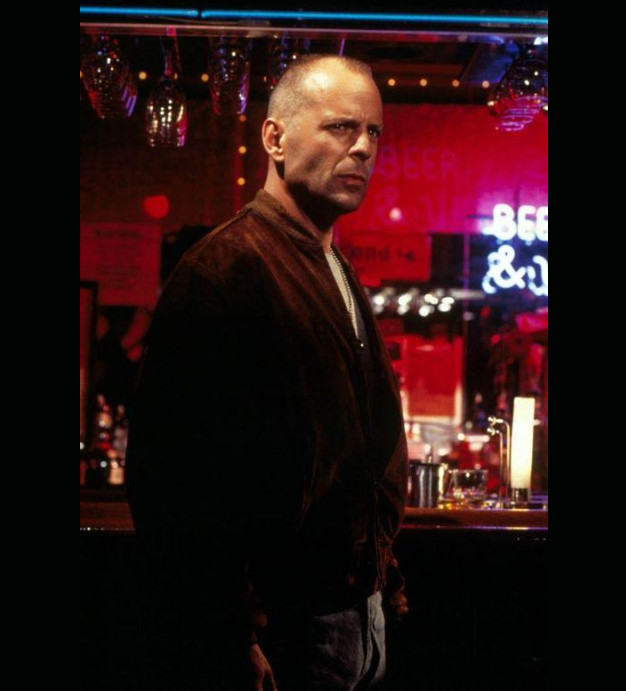In Quentin Tarantino’s cult classic “Pulp Fiction,” a film renowned for its intricate narrative structure and colorful cast of characters, one figure stands out as a beacon of rugged determination and moral complexity: Butch Coolidge, portrayed with understated brilliance by Bruce Willis. As a past-his-prime prizefighter grappling with a moral dilemma, Butch Coolidge is a character defined by his unwavering loyalty, resourcefulness, and haunted past. Yet, beneath the surface of this enigmatic figure lies a wealth of subtle nuances and hidden depths that enrich his portrayal. In this comprehensive exploration, we unearth the five essential elements of Bruce Willis’ iconic character that you might have missed.
1. Boxer with a Moral Dilemma: Pride vs. Principle
At the heart of Butch Coolidge’s character lies a profound moral dilemma that serves as the linchpin of his narrative arc. As a past-his-prime prizefighter offered a hefty sum to throw a fight, Butch is faced with a choice that will test the very core of his integrity. On one hand, the allure of financial gain beckons, promising a shortcut to prosperity and security. On the other hand, Butch’s pride and sense of honor compel him to defy expectations and emerge victorious in the ring.
Bruce Willis masterfully conveys the internal conflict raging within Butch, capturing the character’s inner turmoil and moral ambiguity with understated intensity. Through subtle glances and nuanced expressions, Willis imbues Butch with a sense of depth and complexity that elevates him beyond the confines of a mere action hero, transforming him into a figure of genuine human frailty and resilience.
2. Strong Sense of Loyalty: The Gold Watch and Family Legacy
Despite his gruff exterior and propensity for violence, Butch Coolidge is defined by his unwavering sense of loyalty and honor. Nowhere is this more evident than in his defiant refusal to throw a fight for the menacing gangster Marsellus Wallace. Instead, Butch risks life and limb to retrieve a family heirloom—a gold watch passed down through generations—that serves as a tangible link to his familial legacy.
In a poignant and emotionally resonant subplot, Butch’s quest to reclaim the gold watch becomes a metaphor for his commitment to preserving his family’s honor and memory. Bruce Willis imbues Butch’s actions with a sense of gravitas and solemnity, underscoring the character’s unwavering resolve and steadfast loyalty in the face of adversity.
3. Man of Action: Resourcefulness in the Face of Danger
Throughout the course of “Pulp Fiction,” Butch Coolidge proves himself to be a man of action, capable of navigating treacherous situations with a combination of cunning and physical prowess. From narrowly escaping the clutches of a sadistic pawnshop owner to engaging in a high-speed pursuit on a chopper motorcycle, Butch demonstrates a remarkable ability to think on his feet and adapt to rapidly changing circumstances.
Bruce Willis imbues Butch’s actions with a sense of gritty determination and tenacity, portraying the character as a formidable force to be reckoned with. Whether he’s wielding a katana in a fierce showdown or making a daring escape from certain death, Butch Coolidge emerges as a quintessential example of the archetypal action hero—a figure defined by his resourcefulness, resilience, and unyielding determination.
4. Not Much of a Talker: Silence Speaks Volumes
In a film populated by verbose and loquacious characters, Butch Coolidge stands out as a man of few words. Unlike the fast-talking and witty protagonists that populate many of Quentin Tarantino’s films, Butch prefers to let his actions speak louder than words. Throughout “Pulp Fiction,” he communicates primarily through terse exchanges and meaningful glances, eschewing unnecessary dialogue in favor of a more minimalist approach to storytelling.
Bruce Willis’ portrayal of Butch Coolidge is characterized by a sense of quiet intensity and understated gravitas, with the actor relying on subtle facial expressions and body language to convey the character’s inner thoughts and emotions. By embracing silence as a narrative tool, Willis imbues Butch with a sense of enigmatic mystique, inviting audiences to decipher the complexities of his character through subtle cues and nuances.
5. Haunted by the Past: Sentimentality Amidst the Chaos
Beneath Butch Coolidge’s stoic exterior lies a deep well of emotional turmoil and unresolved trauma, stemming from a turbulent past that continues to haunt him to this day. A poignant flashback sequence reveals a sentimental side to Butch, as he reflects on the significance of the gold watch—a cherished memento that serves as a poignant reminder of his family’s legacy and the sacrifices made by those who came before him.
Bruce Willis imbues Butch’s moments of introspection with a sense of vulnerability and pathos, capturing the character’s inner turmoil and emotional fragility with understated poignancy. Through his nuanced performance, Willis humanizes Butch Coolidge, transforming him from a mere archetype into a fully realized and emotionally resonant character—a man grappling with the ghosts of his past as he navigates the chaos of the present.
6. Possible Dream Sequence: Blurring the Lines of Reality
In one of the most enigmatic and debated sequences in “Pulp Fiction,” Butch Coolidge finds himself confronted by a mysterious figure in a surreal and dreamlike setting—a moment that blurs the lines between reality and fantasy, leaving audiences questioning the true nature of Butch’s journey. Some interpret this scene as a pivotal moment of redemption for Butch, while others see it as a hallucinatory reverie born from the character’s subconscious mind.
Bruce Willis’ portrayal of Butch Coolidge in this ambiguous sequence is marked by a sense of introspection and existential angst, as the character grapples with his own mortality and the consequences of his actions. Through subtle shifts in demeanor and expression, Willis invites audiences to interpret the scene’s meaning for themselves, adding another layer of complexity to Butch’s character and the overall narrative of “Pulp Fiction.”
Conclusion: Unraveling the Enigma of Butch Coolidge
In the tapestry of Quentin Tarantino’s “Pulp Fiction,” Butch Coolidge emerges as a character of profound depth and complexity—a figure defined by his moral ambiguity, unwavering loyalty, and haunted past. Through Bruce Willis’ nuanced performance, Butch transcends the confines of a mere action hero, evolving into a fully realized and emotionally resonant character whose journey resonates with audiences long after the credits roll.
From his moral dilemma as a boxer grappling with questions of integrity and honor to his silent stoicism in the face of danger, Butch Coolidge is a character rich in nuance and symbolism—a multifaceted enigma whose true nature eludes easy categorization. As audiences continue to unravel the mysteries of “Pulp Fiction,” the enduring legacy of Butch Coolidge serves as a testament to the power of storytelling and the indelible impact of a truly iconic character.



